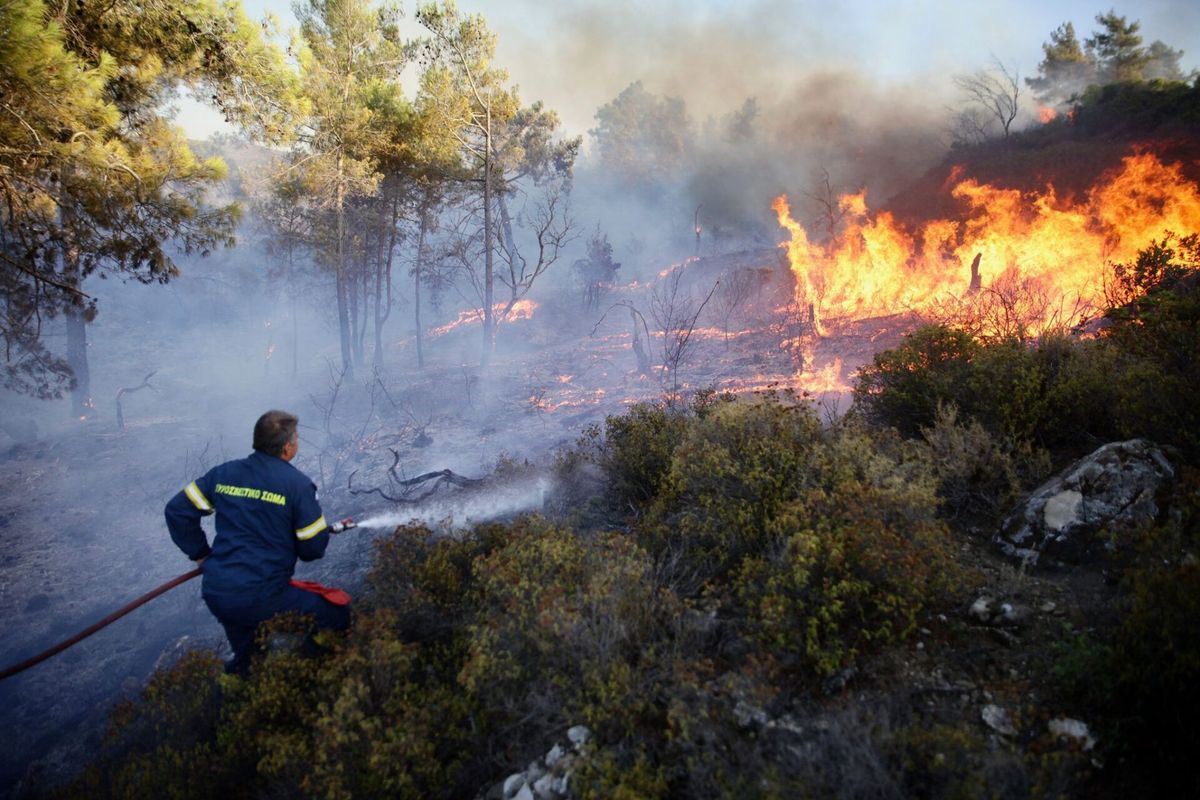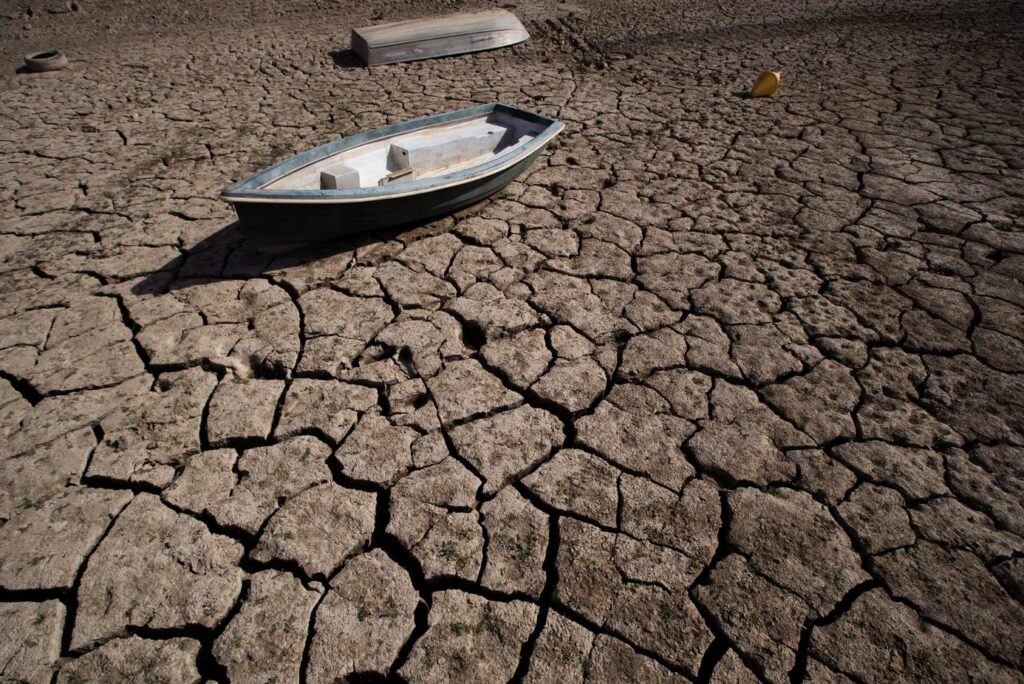Europe gripped by extreme weather, ‘era of global boiling has arrived’
Record-breaking heatwaves and droughts, devastating wildfires, torrential rain and hailstorms all across Europe are costing lives, damaging infrastructure, diminishing biodiversity and hitting tourism, harvests and the economy.

by AFP, AGERPRES, ANSA, dpa, EFE, Europa Press, FENA, STA, Tanjug | 04.Aug 2023 | Key Story
Heatwaves have simultaneously gripped three continents in the Northern Hemisphere this summer as global warming worsens. In Mediterranean countries especially favoured by tourists, such as Spain, Italy and Greece, temperatures have topped 40 degrees celsius in places, and further heatwaves are expected. The Mediterranean region has long been classified as a climate change hotspot by the United Nations Intergovernmental Panel on Climate Change (IPCC).
July is set to be the hottest month in thousands of years, climate scientists from the World Meteorological Organisation (WMO) and the European Climate Change Service Copernicus reported after analysing data up to July 23.
“We don’t have to wait for the end of the month to know this. Short of a mini-Ice Age over the next days, July 2023 will shatter records across the board,” UN Secretary-General António Guterres said, adding that “the era of global warming has ended; the era of global boiling has arrived.”
The era of global warming has ended; the era of global boiling has arrived.UN Secretary-General António Guterres
Scientists from the World Weather Attribution initiative said the heatwaves that have hit parts of Europe and North America in July would have been almost impossible without human-caused climate change.
“We are seeing unprecedented changes all over the world,” top NASA climatologist Gavin Schmidt said, with records being broken on land and at sea.
Over the past year, more than 60,000 people have died in Europe due to extreme heat, according to Hans Kluge, the World Health Organisation’s director for Europe, adding that the number of deaths from extreme heat “is set to rise year-on-year.”
Europe split in two extremes
Although the weather in Germany and northern Europe this July felt less warm than in other summers, heatwaves in North America, Asia and southern Europe lifted the global average.
Greece has been battling devastating wildfires driven by intense heat on the islands of Evia, Corfu and Rhodes. Thousands of people have been evacuated. According to the European Commission, European Union countries have been supporting Greece with almost 500 firefighters and seven planes deployed to different areas in the country.
“Together, we are deploying available resources to fight the fires and protect our citizens and landscapes,” EU Crisis Commissioner Janez Lenarčič said in a statement. Countries worldwide can request help from EU members in case of a disaster, with the European Commission coordinating the deployment of civil protection equipment and experts.
Aside from Greece, other countries in Europe such as Turkey, Spain, Portugal, Italy and France are also facing abnormally sweltering temperatures. In Turkey, temperatures around the Aegean and Mediterranean Sea are up to 8 degrees above the usual level for this time of year, according to the weather service. Fires caused landmines to explode near the southern Croatian city of Dubrovnik, local media reported.

So far this summer, Spain has avoided major fires but the country has suffered a drought caused by high temperatures and a months-long lack of rain. After experiencing the second driest spring in 62 years, several areas, such as the two most populated regions Andalusia and Catalonia, have been hit by critically low water levels in reservoir and other storage sites. Reservoirs in Andalusia were at 24 percent of their total capacity last week, while this week in Catalonia, internal basins barely reached 27 percent.
Meanwhile, many European countries and regions experienced other extreme weather events, such as storms with extreme rainfall and wind.
Bosnia and Herzegovina, for example, saw floods and torrents caused by heavy rainfall in May and June which was followed by a first heatwave. Storms and strong winds have caused severe material damage particularly in the north, but also in the southern parts of Bosnia.
While Slovenia was battling the worst fires in its history this time last year, 2023 has seen it face extremely severe storms with heavy rainfall, hail and gail-force winds. Serbia has equally been affected by storms and hail which damaged crops, infrastructure, cars and residential buildings.
Italy experienced “one of the most complicated days in recent decades – rainstorms, tornadoes and giant hail in the north, and scorching heat and devastating fires in the centre and south,” said Italian Civil Protection Minister Nello Musumeci. The country battled deadly and destructive fires in the south and equally fatal storms in the north which left at least seven people dead and caused severe damage to property, infrastructure and crops. Most of the fires were caused by arson, prosecutors said.
Extreme temperatures affecting business, infrastructure and peoples’ safety
With extremely high temperatures, the need for air conditioning has driven up electricity consumption which in some countries led to day-long or repeated power outages as well as damage to underground cables.
The Maltese Hotel and Restaurant Association reported that frustrated guests had checked out of hotels because of the power cuts. Restaurants and supermarkets in the country had to throw away defrosted food while malfunctioning air conditioners caused Italian McDonald’s staff to strike. They complained that they had been “suffocating” in the “intolerable” 40-degree-plus temperatures in the outlets. Several farm labourers have died of heatwave-related causes in Italy, too. CGIL, Italy’s biggest trade union, urged authorities to step up efforts to protect workers from the effects of the tropical temperatures that have hit the country. Maurizio Landini, CGIL’s leader, said “the heatwave is increasing the risks to the health and safety of female and male workers”. He added that “this is totally unacceptable.” As a result, the Italian government is now working on a protocol on heat risks and issues at Italian workplaces.
The heatwave is increasing the risks to the health and safety of female and male workers.Maurizio Landini, leader of Italy’s biggest trade union CGIL
In Germany, the rains are affecting harvests of grain, fruit and vegetables. While the rainfall has forced grain farmers to interrupt their harvests again and again, fruit and vegetable growers are content. Torsten Krawczyk, president of the Saxon state farmers’ association, said it had been the most expensive harvest ever. The costs for fertiliser, for example, were twice to three times as high. Significantly more money also had to be paid for labour and energy.
Mitigating climate change, building resilience and protection
Recent extreme weather conditions have prompted governments across Europe to step up their civil protection efforts and take appropriate measures to protect their citizens. UN Secretary-General Guterres called on politicians to take immediate and drastic steps to curb climate change and Pope Francis also renewed his call for action to address the climate crisis in the face of extreme weather events.
In response to water scarcity in Spain, the regional government of Catalonia has declared a situation of “water exceptionality” in most of its territory. In the almost 500 municipalities affected by the shortage – home to six million people – a restriction of 230 litres of water per inhabitant per day for domestic use has been imposed. A 40 percent reduction in water for agricultural use and a 15 percent cut for industry have also come into force.
In May, the Spanish government approved measures to prevent accidents and deaths in outdoor work that may be affected by adverse weather such as heatwaves. Maltese authorities issued a heat warning urging people not to leave their homes between 11 a.m. and 4 p.m., the hottest hours of the day. Similarly, the Romanian Territorial Labour Inspectorate made it mandatory for employers to take measures to protect their employees’ health, such as reducing the intensity of physical activities, ensuring ventilation in the workplace, interspersing physically demanding work with less active duties and introducing more breaks out of the hot sun during working hours.

German Health Minister Karl Lauterbach (SPD) presented a heat protection plan in late July in a bid to halve the number of heat-related deaths this year, mainly by providing more public guidance on how to cope with hot weather. While some saw it as a good starting point, a health policy expert from the opposition conservative CDU Tino Sorge, accused Lauterbach of inappropriate alarmism as common sense should be the guiding principle for protection and prevention.
Slovenia is warming faster than the global average due to its geography, with an average temperature rise of 2.2 degrees between 1980 and 2021. More investment in prevention would definitely be needed, said Environment Minister Uroš Brežan. He stressed that there was a particular need to safeguard water supplies. Business leaders and politicians have been pointing to the need for systemic measures to adapt to climate change as well as intervention to tackle the consequences.
Italian Environment and Energy Security Minister Gilberto Pichetto said “the government is already engaged on this front to ensure close coordination between all the implementing bodies, both in emergencies and ordinary periods.” However, he insisted that “the main problem is not funding, but the spending mechanism and procedures”.
Record breaking extreme weather not enough to convince some that climate change is real
Despite the extreme weather in Italy, 34.7 percent of Italians believe there is excessive alarm about climate change, according to the Ital Communications-Censis report “Disinformation and fake news in Italy’” The report also showed that 16.2 percent of the overall population denies that climate change exists, with the percentage rising to 18.3 percent among the elderly and to 18.2 percent among the less educated.
***************************************************************************
The News Agency of the Slovak Republic (TASR) is a part of project called the EuropeanNewsroom (ENR). The aim of the project is to strengthen news services from various countries in Europe and to support cooperation between the agencies' international news reporters. The ENR project includes the following agencies: AFP, ANSA, Agerpres, APA, ATA, Belga, BTA, DPA, EFE, Europa Press, FENA, HINA, MIA, STA, Tanjug and TASR. Polish news agency PAP is an associated partner, while the Ukrinform agency is also participating in the project as part of the solidarity shown to Ukraine.



